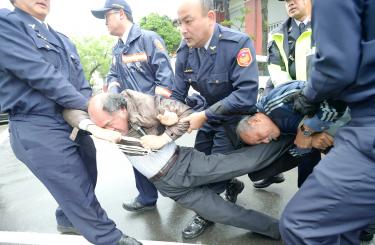While the government has consented to China’s inauguration of a new commercial flight route near the middle of the Taiwan Strait starting tomorrow, opponents continued to rail against the plan yesterday, leading to the adjournment of a regular legislative session.
Legislative Speaker Wang Jin-pyng (王金平) at about noon declared the question-and-answer session with Premier Mao Chi-kuo (毛治國) adjourned until Tuesday, following hours of fruitless talks among party caucuses on the demands made by the Taiwan Solidarity Union (TSU).
The TSU demanded that the implementation of the M503 route be put off until information regarding the negotiations about the route between Taiwan and China that took place earlier this month is deliberated and approved by the legislature, TSU Legislator Lai Cheng-chang (賴振昌) said.
Should China insist that it will start using the route, the government should indefinitely suspend any further negotiations with China because the move would be tantamount to infringement into Taiwan’s airspace, Lai said.
Cross-strait talks are scheduled to be held on Tuesday in Beijing, the 10th round of talks to conclude a trade in goods agreement.
The government recently gave its consent to the proposed route after Beijing agreed to revise its original plan, announced in January, by moving the route westward by 6 nautical miles (11km) and delaying the adoption of three feeder routes: W121, W122 and W123.
However, many in Taiwan remain concerned about the security risks, as the route still comes as close as 10.2 nautical miles to the median line of the Taiwan Strait.
In addition to the government saying it understands that the congestion of China’s A470 route warrants the opening of a new route, National Security Bureau Director-General Lee Shying-jow (李翔宙) on Thursday said that the implementation of the M503 route would force China’s military jets to patrol farther from Taiwan and thus give Taiwan more leeway on defense.
Lee’s argument and that of Chinese Ministry of National Defense official Geng Yansheng (耿雁生), who on Thursday described the route as an “air passage of peace,” suggested that Beijing did not designate the M503 unilaterally, but in collusion with President Ma Ying-jeou’s (馬英九) administration, Democratic Progressive Party Legislator Huang Wei-cher (黃偉哲) said yesterday.
When TSU lawmakers occupied the podium to boycott the session, dozens of activists broke into the legislative compound in a surprise protest against the government’s handling of the issue, but they were stopped outside the building as security guards quickly pulled down a steel door.
The protesters shouted: “Abolish M503” and other slogans denouncing the government’s concessions as a “forfeiture of the nation’s sovereignty.”
They were forcibly removed from the legislative complex by police.
Activists staged a similar protest on Thursday at the offices of the Mainland Affairs Council.
Source: Taipei Times - 2015/03/28





















